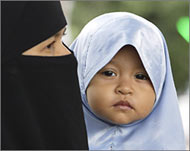Now Thailand wants a security fence
Thailand will build security fences along parts of its 650km border with Malaysia to try to stop separatists escaping after attacking Thai forces, Prime Minister Thaksin Shinawatra has said.

The army would build the fences across suspected escape routes used by Muslim secessionists in Thailand’s largely Muslim south, where a new wave of violence began last month when armed men raided an army base, he said.
“We will focus on areas with cross-border smuggling problems which are not too many. We don’t have to build fences all along the entire 600km border,” Thaksin told reporters in Bangkok.
A massive security operation has failed to catch the gunmen who stole more than 100 weapons, mostly M-16 assault rifles, in the attack, or the people who set ablaze 21 state schools in an operation officials believe was a diversion.
Since then, several Buddhist monks and police and civil servants of both religions have been killed by machete-wielding raiders or gunmen.
Some officials believe those behind the attacks may have links to Jamaah Islamiah, widely regarded as the Southeast Asian branch of al-Qaida.
Two killed
In the latest border incident last Saturday, two people were shot dead in the southern province of Narathiwat province while Thaksin was talking to officials about how to halt the violence.
 |
|
Thailand is home to six million |
Police believe the attackers were connected to apparently resurgent separatist groups in a region that is home to most of Thailand’s six million Muslims, almost 10% of the
population. The attackers fled after the ambush.
Thaksin had said the government would pour money into the south, focusing on economic development in Yala, Pattani and Narathiwat provinces near the Malaysian border, where a low-key separatist insurgency was fought in the 1970s and 1980s.
“I will spend about three years making them places for tourism, investments and jobs,” Thaksin said in his weekly radio address on Saturday. “People will also have better education.”
Islamic university
Thailand also announced on Tuesday it would open a branch of a prestigious Egyptian Islamic university this year with the backing of Bahrain. This came as Thailand mulled restrictions on Islamic schools in its restive south.
|
“Many Thai Muslims have to go abroad (for university-level Islamic study). We thought it would be a good idea to have a university of our own” Sihasak Phuangketkeow, |
“The idea of having an Islamic university is something that the Thai government has long considered,” foreign ministry spokesman Sihasak Phuangketkeow said.
“Many Thai Muslims have to go abroad (for university-level Islamic study). We thought it would be a good idea to have a university of our own,” he told AFP.
The plans gained momentum when Foreign Minister Surakiart Sathirathai visited Egypt and met officials from Al-Azhar university to propose cooperation on a branch campus here.
Al-Azhar university
“Two or three weeks ago Al-Azhar gave their approval and said they will cooperate,” Sihasak said.
|
“It is not about shutting down schools or refusing to open new schools, it’s about bringing them into line by introducing non-secular subjects” Thaksin Shinawatra, |
Last weekend Surakiart visited Bahrain, and received further backing from King Hamad bin Issa Al Khalifa.
The university aimed to open in September, if possible, although the ministry of interior was still considering where it would be located, Sihasak added.
Thailand has hundreds of Islamic secondary schools but no Islamic university.
Talks
Thousands of Thai Muslims have travelled abroad for study in Pakistan, Saudi Arabia and Egypt, but some of the programmes have caught flak.
Thailand’s Justice Minister Pongthep Thepkanjana warned last month Thai students could be receiving “terror training” at Indonesian universities.
Prime Minister Thaksin Shinawatra emerged from talks with Muslim leaders on Tuesday to say he had no plans to shut down Islamic schools, although revamping curricula
was a priority.
“It is not about shutting down schools or refusing to open new schools, it’s about bringing them into line by introducing non-secular subjects,” he said.